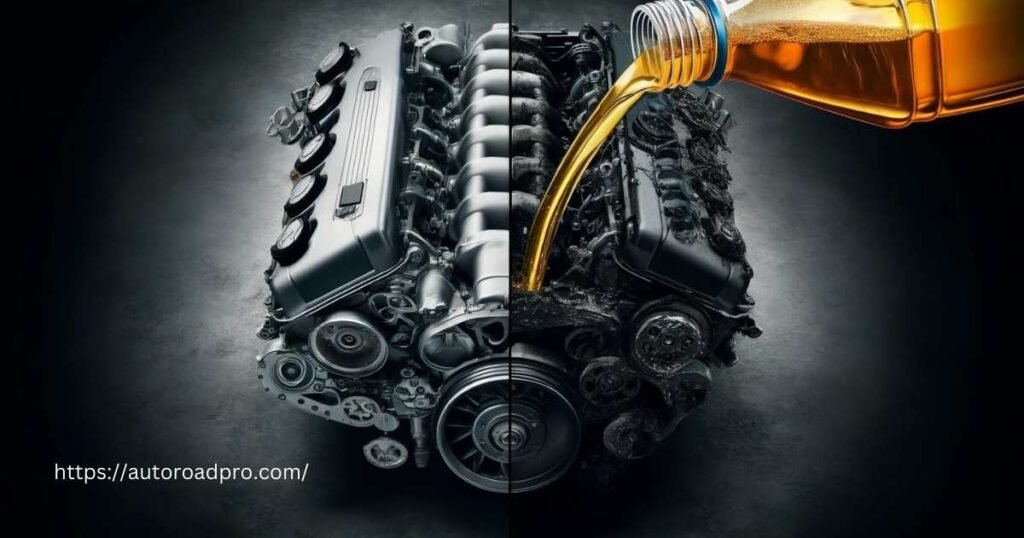I’ve spent many years writing about cars. I often hear: “Do hybrid cars need oil changes?” Let’s talk about this.
Electric Vehicles (EVs) and Hybrid Electric Vehicles (HEVs) are popular for people who care about the environment. They are different from regular cars that use gasoline. But they have different needs when it comes to taking care of them.
Now, here’s something interesting about oil changes and hybrid cars. Hybrid cars are a mix of electric and gasoline power. So, do they need oil changes? Keep reading to find out!
Table of Contents
What are Hybrid Engines and How Hybrid Cars Work?
Hybrid cars are unique because they use both an electric motor and a gasoline engine. This cool combination lets the car use electric power for short trips. Then, when you go on longer journeys or if the battery gets low, the car switches to gasoline power. It’s like having the best of both worlds!
Even though these cars have an electric motor, the gasoline engine works much like the engines in regular cars. This part of the car needs oil to keep it running smoothly. The oil ensures that all the moving parts don’t rub together too much, helping the engine last longer and work better.
A big battery powers the electric part of a hybrid car. This battery gets its power from the gasoline engine and even from braking! When the car goes a short distance, it can use electric power. If you need more power or you’re going further, the gasoline engine starts up to help out.
Do Hybrid Cars Need Oil Changes?
Yes, hybrids do need oil changes! Even though they have an electric motor, it doesn’t do all the work. The gasoline engine in a hybrid car still gets used and can wear out. But there’s good news! Because of the electric motor, the gasoline engine doesn’t always have to work as hard.

This means that hybrids don’t need oil changes as often as regular gasoline-powered cars. The electric motor helps, so the gasoline engine has an easier time. That’s a cool thing about hybrid cars!
Why Hybrid Cars Need Oil Changes, But Less Often?
Hybrid cars need oil changes, but not as often as gasoline cars. Here’s why:
First, the engine in a hybrid car doesn’t run all the time. But it starts and stops frequently, especially in the city. This start-stop action can cause the oil to break down faster than in cars where the engine runs all the time.
Also, over time, engine oil gets worse. It’s exposed to heat and gets dirty from the stuff left after burning fuel. This can make the oil less slippery, which isn’t suitable for the engine.
But there’s good news! Hybrid cars have some things that help make the oil last longer.
Since the hybrid car has an electric motor, the gasoline engine doesn’t have to work as hard. This means less wear on the oil.
Hybrid cars use regenerative braking. This method helps recover some energy and puts less stress on the engine, so the oil stays better for longer.
Why Regular Changes Matter in Hybrid Cars?
Some people think that hybrid cars don’t need oil changes as often because of their electric motors. But the part of the hybrid that’s like a regular car engine still works and gets worn out, just not as fast. Let me explain why it’s essential to change the oil in a hybrid:
Even if your hybrid seems okay, you shouldn’t skip changing the oil. Over time, the oil in your car gets old and can’t protect the engine either. The oil keeps parts inside the engine moving smoothly without rubbing too much. It can’t do this job when it gets old, which might lead to damage or expensive repairs.

Here’s more about why the oil in a hybrid needs changing:
- Oil Oxidation—The oil in the engine can go wrong by reacting with oxygen. This makes it less good at keeping the engine parts lubricated. This can happen even if you don’t use your car much.
- Water and Fuel Buildup—Hybrid engines don’t get as hot as regular cars. This can cause water drops and bits of unburned fuel to mix with the oil, making it less effective at lubricating.
- Frequent Cold Starts—In a hybrid, the engine turns on and off often, especially for short trips. When the engine starts cold, the oil takes longer to spread through all the parts, which can cause more wear.
So, even though hybrids are different, they still need regular oil changes to keep them running well.
How Often Should You Change Oil in a Hybrid Car?
Hybrid cars are great because they don’t need oil changes as often as regular gasoline cars. Depending on how you drive and what the car’s maker suggests, you only need an oil change every 5,000 to 10,000 miles. And if you use synthetic oil, it could be even longer!
This is good news because it means you can save money. Fewer oil changes mean you spend less time caring for your car over time. That’s a nice benefit of driving a hybrid!
What other Services might you need for a hybrid car?
Changing the oil in your hybrid car is important, but there are other things you need to do to keep your car running smoothly and safely. Here’s what else your hybrid needs:
- Tire Rotations and Alignments: Proper tire care makes tires last longer and helps your car use less fuel. So, it’s important to rotate the tires and check their alignment regularly.
- Air Filters: Keeping the air filters clean is key for your engine to work its best and use fuel efficiently.
- Brake Pads and Rotors: You should always ensure your brakes are in good shape. Regular checks and replacement of the brake pads and rotors when needed keep you safe on the road.
- Battery Health: The battery in a hybrid car is made to last a long time, but eventually, it will need to be replaced. This is a big part of keeping your hybrid going strong.
What are the Hybrid Car Maintenance Differences?
Taking care of a hybrid car differs slightly from looking after a traditional gasoline car. Here are three key things that are different:
- Oil Changes—In a hybrid car, the electric motor helps the gasoline engine, so it doesn’t have to work as hard. You only need to change the oil every 5,000 to 10,000 miles. It depends on how you drive.
- Brake Pads—Hybrid cars have a cool way of braking called regenerative braking. It helps save energy and put it back into the battery, which means the regular brakes don’t wear out as fast. So, the brake pads in a hybrid can last longer than those in a gasoline-powered car.
- The Hybrid System—A hybrid’s battery and electric motor usually don’t need regular upkeep. They even have extended warranties, like 8-10 years or 100,000-150,000 miles. But, eventually, the battery will need replacing, which can cost quite a bit.
How can I Learn that my Hybrid Car Needs an Oil Change?
Figuring out when your hybrid car needs an oil change can be done in several ways:
Mileage: This is a simple way to know. Most hybrid car makers say you should change the oil every 5,000 to 10,000 miles. The exact number for your car is in the owner’s manual.
Oil Change Reminder Light: Many new hybrid cars have a light on the dashboard that tells you when it’s time for an oil change. This light turns on based on what the car’s maker programmed it to do, like how many miles you’ve driven and how the engine’s been running.
Check the oil Yourself: It’s not as familiar with hybrids since they don’t need oil changes as often, but you can still check the oil level and how it looks. Your owner’s manual will show you where and how to correct the dipstick. Here’s what to look for:
- Oil Level: The oil should be between the minimum and maximum marks on the dipstick. If it’s low, it might mean there’s a leak, or the car is using up oil.
- Oil Color: New oil looks golden or amber. If it’s dark brown or black, it’s probably time to change it.
- Oil Consistency: The oil should feel smooth and not have any gritty stuff in it.

Unusual Engine Noises: Hybrids are usually quiet, but if you hear strange noises like ticking or knocking from the engine, it could be a sign that the oil level is low or the oil is old.
Talk to a Mechanic: If you’re not sure when to change the oil, ask a mechanic. They can look at the oil, consider your driving habits, and tell you when it’s time to change.
Which Oil Type for Hybrid Cars Should Be Used? Synthetic vs. Conventional Oil
If you’re wondering whether to use conventional or synthetic oil in your hybrid car, I’ve looked into it, too. Both are made from petroleum, but synthetic oil undergoes a more detailed refining process. This extra step turns it into a great product with several benefits:
- Enhanced Performance: I discovered that synthetic oil is better at lubricating the engine in extreme heat and cold. That means your engine can work well in all sorts of weather.
- Extended Longevity: It’s impressive that synthetic oil doesn’t break down as quickly as conventional oil. This means less frequent oil changes, which is super convenient.
- Improved Fuel Economy: Another cool thing is that synthetic oil helps reduce friction, which can slightly improve how much fuel your car uses.
However, synthetic oil’s advantages come at a higher price than conventional oil. But the extra cost can be worth it for the benefits.
What are the Key Considerations for Hybrid Car Oil Changes?
I always remember some essential things about oil changes for my hybrid car. First, if I’m mostly taking short trips, I change the oil yearly, even if I haven’t driven a lot. Short trips don’t let the car warm up thoroughly, leading to more moisture in the oil, which could be better.
Another thing I pay attention to is the type of oil I use. It’s really important to use the oil type recommended by the manufacturer. For hybrid vehicles, they often recommend synthetic oil. This is because it performs better and lasts longer than regular oil. So, I always check what my car needs and use that type to keep my hybrid in top shape!
Final Verdict
Hybrid cars are cool and smart, but like other cars, they need regular oil changes. If you know what your hybrid engine needs and follow the schedule suggested by the car’s maker or your mechanic, your hybrid will work really well, be efficient, and last a long time.
It’s good to remember that taking care of your car before problems arise is a big help. This kind of maintenance can save you money and prevent you from having troubles later.
So, taking a little time to look after your hybrid car can greatly improve its performance and longevity.
Relevant:
What Maintenance Does an Electric Car Need?
What Maintenance Does a Car Need?
Do Electric Vehicles Need Oil Changes?
FAQs
How often do hybrids need an oil change?
Hybrids don’t need oil changes as often as regular gasoline cars. This is because the electric part of the car does a lot of the work, which means the engine doesn’t wear out as quickly. But they still need oil changes! Most hybrid makers say to do them every 5,000 to 10,000 miles. Look at your owner’s manual for your car’s specific needs, as they depend on engine size, oil type, and how you drive.
Does an oil change on a hybrid cost more?
Sometimes, the oil change for a hybrid can cost a bit more. Hybrid cars need special types of oil, like synthetic oil, which can be pricier than regular oil. Also, some hybrids might need extra filters or have a trickier oil change process. But, because you don’t have to change the oil as often in a hybrid, you might spend less on oil changes over time than a regular gasoline car.
How often do you need to service a hybrid car?
How often you service your hybrid depends on the manufacturer’s recommendations and how you drive. Usually, you should check things every 6 months or 5,000 miles, whichever comes first. This might be basic stuff like checking things over and topping off fluids.
As the owner’s manual says, bigger services might only be needed occasionally, like changing spark plugs or checking the big battery.
What maintenance is required for a hybrid?
Hybrids need many of the same things as regular cars, such as:
- Tire rotations and alignments
- Brake pad replacements (though brakes can last longer because of regenerative braking)
- Air filter replacements
- Cabin air filter replacements
- Wiper blade replacements
- Checking and topping off fluids like coolant and brake fluid
But hybrids have some special needs, too:
- A trained mechanic should check the high-voltage battery at certain times.
- Changing the inverter’s coolant turns battery power into electricity for the motor.

